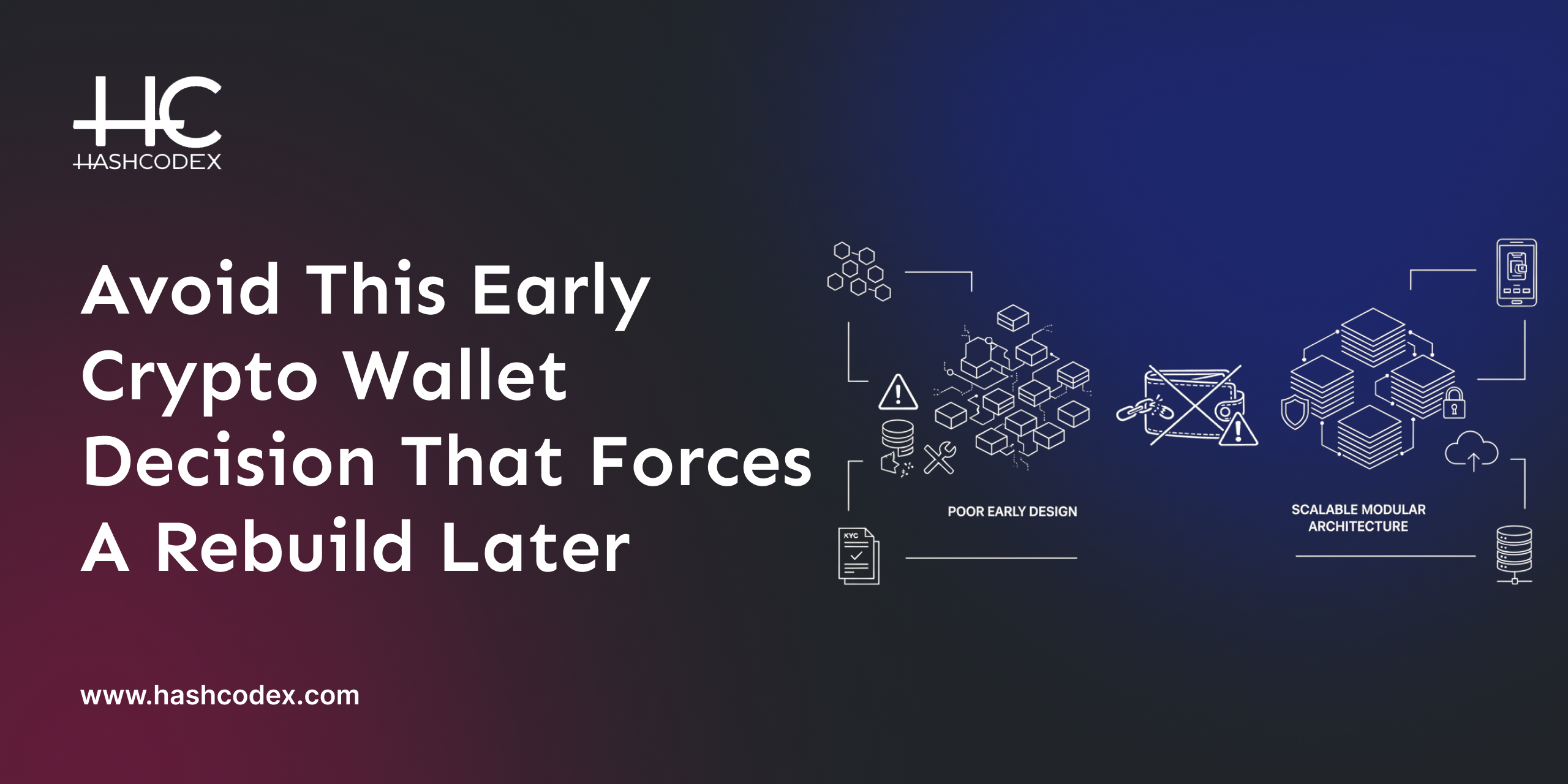Ever wondered how much it actually costs to build a crypto wallet? Is it $10,000, $50,000, or even more? The fact is: there's no fixed price; it all depends on what you want.
A simple wallet with basic features can start from $10,000, but if you want something more advanced, the cost can increase. Features, design, security, and even where your developers are located all play an important role.
In this blog, we'll break down the cost of crypto wallet development in simple terms, show you the key factors that influence it, and give practical ideas for saving money.
Read on to know the exact price.
What is Crypto Wallet Development?
Crypto wallet development is the process of creating a digital application that allows users to securely store, send, receive, and manage cryptocurrencies. It involves developing features like private key management, transaction tracking, multi-currency support, and strong security measures such as encryption and two-factor authentication.
Businesses invest in crypto wallet development to give users a safe, easy-to-use tool for handling digital assets across web, mobile, or desktop platforms.
Main Factors That Decide Crypto Wallet Development Cost
The cost of building a crypto wallet depends on many factors, from the type of wallet you choose to the features you add. Knowing these factors early allows you to budget wisely, prevent hidden costs, and ensure that your wallet satisfies user expectations without overspending.
Here are the main factors that decide the overall crypto wallet development cost:
Type of Crypto Wallet
The type of wallet you select has a direct influence on the cost.
- Hot wallets (online wallets) are faster and less expensive to create since they connect to the internet.
- Cold wallets (offline wallets) require stronger security and advanced design, which increases the cost.
The more advanced the wallet type, the more budget is required.
Features and Functionalities
Basic features such as sending and receiving crypto, transaction history, and single blockchain support are affordable.
But if you want:
- Multicurrency support
- Cross-chain compatibility
- Real-time alerts and push notifications.
- Custom UI/UX
The cost increases due to additional development time and integration demands.
Security Levels
- Standard security is essential, but advanced protections like 2FA, multi-signature, and cold storage could influence the cost.
- Meeting compliance rules (KYC, AML, GDPR) also adds extra time and money.
Blockchain Integration
- A wallet built for a single blockchain (e.g., Bitcoin) is simpler and cheaper.
- Multi-blockchain support (Ethereum, BNB Chain, Solana, etc.) requires higher-level development and involves more expenses.
Design and User Experience (UX)
- Simple, uncluttered designs keep expenses down.
- Custom designs with easy navigation, animations, or detailed user flows may raise the costs.
Platform and Device Compatibility
- A crypto wallet designed for a single platform, like as Android, is less expensive.
- Multi-platform apps (iOS, Android, and Web) require more code and testing, which increases the cost.
Development Team and Expertise
The cost of your wallet is also determined by who built it.
- A top-tier development company with crypto industry experience will charge extra but ensure quality.
- Outsourcing to lower-cost locations may save money, but it may compromise speed and service.
Development Method
There are two main approaches:
- Building from scratch: Provides complete customization, best for existing businesses that want to grow.
- White-label wallet solutions: It is a pre-built software that is faster and affordable, but has limited customization options.
Choosing the right method depends on your budget, timeline, and goals.
Your wallet's type, features, security, and team selection will decide whether you spend little or a lot. With the right balance, you can limit costs. Let’s have a detailed look at how it actually costs.
How Much Does it Cost to Develop a Crypto Wallet?
The cost to develop a crypto wallet may range from $10,000 to $100,000, depending on the type, features, security, and complexity. Here’s a breakdown of typical cost ranges:
Basic Crypto Wallet ($10,000 to $25,000)
- Simple mobile wallet.
- Basic send/receive and balance tracking.
- Minimal security (password and minimal encryption)
Intermediate Crypto Wallet ($25,000 to $50,000)
- Multicurrency support
- Transaction history
- Enhanced security: 2FA and encrypted private keys.
- Web and mobile versions
Advanced Crypto Wallet ($50,000 to $100,000+)
- Multi-chain support (Ethereum, Binance Smart Chain, and Solana)
- NFT storage and DEX integration.
- Staking and Advanced Analytics
- Strong security: Multi-signature wallets, KYC/AML compliance, and third-party audits.
Keep in mind, these ranges might vary depending on the development team's location, project duration, and other features such as analytics dashboards, push notifications, or user support systems.
| Wallet Type | Estimated Cost | Security Level | Key Features | Development Time |
| Basic Wallet | $10,000 – $25,000 | Basic Encryption | Send/Receive Crypto, Balance Tracking, Simple UI | 4–6 weeks |
| Intermediate Wallet | $25,000 – $50,000 | 2FA, Encrypted Private Keys | Multi-Currency Support, Transaction History, Web + Mobile Versions, Push Notifications | 8–12 weeks |
| Advanced / Enterprise Wallet | $50,000 – $100,000+ | Multi-Signature, KYC/AML, Security Audits | Multi-Chain Support, NFT Storage, DEX Integration, Staking, Analytics Dashboard | 16–24 weeks |
The Hidden Compliance and Legal Costs in Crypto Wallet Development
When building a crypto wallet, most people prioritize design, features, and security. But one important area often missed is compliance and legal requirements. These hidden costs can surprise many businesses if they aren’t planned for from the start.
Here’s what you need to know:
KYC (Know Your Customer)
- If your wallet supports buying, selling, or exchanging crypto, you'll most likely require a KYC system to validate users' identities.
- Setting up a secure KYC procedure involves additional development and integration costs.
AML (Anti-Money Laundering)
- Governments need AML protocols to prevent illegal transactions.
- Adding AML tools and transaction monitoring systems requires both technical and regulatory expenditures.
Licensing and Registration
- In certain areas, crypto wallet businesses must get licenses before operating.
- The process varies by location and can be pricey and time-consuming.
Data Protection Laws (GDPR, CCPA, etc.)
- Your wallet must secure user data and comply with local privacy rules.
- This means investing in safe servers, data encryption, and legal consulting.
Legal Consultation and Audits
- Hiring legal professionals and conducting frequent audits can help you prevent penalties later.
- Although it increases your budget, it builds long-term trust with users and regulators.
Ignoring these compliance and legal concerns might result in fines, limitations, or even a suspension of your app. While they may appear to be "extra costs" at first, they are actually investments in safety, trust, and long-term success.
Smart Tips to Optimize Your Crypto Wallet Development Cost
Building a crypto wallet can get expensive if you’re not careful. But the good news is, you can save money and still build a strong, safe wallet. Here are some simple tips to help:
- Work with the Right Team
Partnering with a team that already knows blockchain and fintech will help you avoid costly errors. Skilled developers understand how to include features like as multi-signature security, DeFi support, and an easy-to-use interface without wasting time or money.
- Pick the Best Tech Tools
Using the right coding languages and tools makes a big impact. For example, Ethereum uses Solidity, whereas Solana uses Rust. If you want to create an app for both iOS and Android, tools like Flutter or React Native can help save time and money.
- Build in Parts (Modular Design)
Instead of building the wallet in one piece, construct it in sections. This allows you to add more features later on, such as staking or NFT support, without redoing the entire software. It's reasonable and easy to grow.
- Use Cloud Hosting
Hosting your software on cloud services like Amazon Web Services or Google Cloud is low cost than setting up your own servers. Furthermore, it allows your wallet to manage more users simply as it expands.
- Hire Smart, Not Expensive
Developers in Eastern Europe and Asia can provide high-quality services at a lower cost. Just make sure they have practical experience with cryptocurrency wallets and follow safety guidelines.
By following these tips, you can manage your crypto wallet development cost wisely, ensuring your wallet is not only affordable but also safe, scalable, and ready for growth.
How to Maximize ROI From a Crypto Wallet App?
When developing a crypto wallet app, the features you choose have a direct impact on your ROI. The more value your software provides, the more revenue possibilities it holds for you.
But here's a trick: not every feature increases your ROI. You should focus on those that provide both customer satisfaction and financial sources. Let's take a look at some key features that might help maximize returns.
Crypto Withdrawals
Allowing users to easily withdraw their crypto is necessary. But whenever users withdraw, you can charge a small transaction fee. This generates a consistent revenue stream for wallet owners while ensuring an easy process for customers.
Staking Options
Staking is one of the most ROI-friendly features. It allows users to lock their crypto in their wallets for a certain period, so it supports the blockchain network. In return, wallet owners receive a share of the staked assets. The funds can then be reinvested in other ventures, such as ICOs, trading, or even real estate.
Token Swapping
Token swapping enables users to exchange one crypto token for another within their wallet. By allowing this, you may provide comfort to users while collecting a small fee for each exchange. Over time, this function can become a major revenue source.
Advanced Security Features
Strong security features such as multi-signature wallets, 2FA, and biometric authentication may raise development costs, but they improve trust and longevity. Users are more likely to stay with a wallet that they feel comfortable using, resulting in more transactions and a greater ROI.
Conclusion
Building a crypto wallet is not just about developing an app; it is about building trust, security, and growth opportunities. The final cost depends on what you develop, who builds it, and how smartly you make decisions along the way.
As a professional crypto wallet development company, Hashcodex provides smart and cost-effective solutions without compromising quality. Our team combines deep blockchain experience with a practical approach to deliver wallets that are safe, scalable, and user-friendly. That's why businesses around the world trust us to provide wallets that are not just reliable but also ready for the future.
Whether you're just getting started with a simple wallet or want to create a fully customized multi-chain solution, we're here to help you.
Reach out to Hashcodex and let’s build a wallet that users will trust and love.











